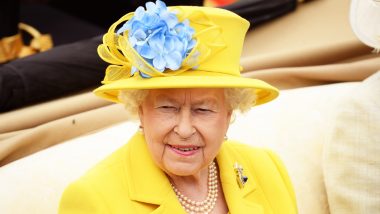London, February 3: Britain's Queen Elizabeth II and other senior members of the royal family may have to be evacuated if the UK experiences riots as a result of a no-deal Brexit next month, a media report said on Sunday. The UK is set to exit the 28-member European Union (EU) on March 29. As the risk of Britain leaving the EU without an amicable withdrawal agreement continues to hang over ongoing negotiations, emergency proposals to rescue the royal family during the Cold War era have been "repurposed" in recent weeks to ensure their protection. The plans were originally intended to be put into action in the event of a nuclear attack from the erstwhile Soviet Union, 'The Sunday Times' reported.
In the event of the UK and EU failing to agree a settlement before the Brexit deadline of March 29, the Queen and her husband, Prince Philip, will be moved out of London to a secret location, which the newspaper said it has agreed not to disclose. "These emergency evacuation plans have been in existence since the Cold War, but have now been repurposed in the event of civil disorder following a no-deal Brexit," a UK Cabinet Office source was quoted as saying in the report. UK PM Theresa May Calls for Vote on Brexit Bill but Opposition Tables No Confidence Motion.
With just 54 days to go until the UK is due to leave the EU, Britain's civil servants are ramping up no-deal planning, including the contingency plans for the royal family. This is understood to have included discussions between Scotland Yard and regional police forces. "If there were problems in London, clearly you would remove the royal family away from those key sites," said Dai Davies, the former head of royal protection at the Metropolitan Police.
"Where and how they will evacuate them is top secret and I can't discuss it. This is a measure that is extremely unlikely to come to pass. (But) the powers-that-be need to have contingency plans for any eventuality," he said. Originally codenamed 'Operation Candid', plans were drawn up for the Queen to be evacuated to sea on the royal yacht Britannia if the Soviet Union launched a nuclear attack.
After the royal yacht was mothballed in 1997, the plans were amended to include evacuation via the Hebridean Princess, a cruise ship that would have ferried the royals around the remote Scottish islands in the event of disaster. The plans, first devised in 1962 after the Cuban missile crisis and approved the following year, have now been revived by senior civil servants involved in contingency planning for Operation Yellowhammer, the battle plan for what happens in the event of a no deal when border arrangements with the EU will be thrown into chaos.
The revelation follows weeks of uncertainty around Brexit negotiations, with the UK Parliament rejecting Prime Minister Theresa May's Withdrawal Agreement and then voting for her to reopen negotiations over a controversial Irish "backstop", intended to avert a hard border between Britain and EU member-country Ireland in future. Critics fear the clause could keep Britain tied to EU rules even after Brexit.
Ireland's Deputy Prime Minister Simon Coveney warned that there are "no credible alternative arrangements" and said the UK is risking its peace process with Ireland by trying to renegotiate the Withdrawal Agreement. "The EU will not renegotiate the withdrawal agreement and there will be no withdrawal agreement without the backstop," he said, adding that there is a deal on the table, and walking away from it will have serious consequences for us all."
Meanwhile, May stressed that she was determined to deliver Brexit within the March deadline period. Writing in 'The Sunday Telegraph', she said she would return to Brussels with a "fresh mandate, new ideas and a renewed determination". She rejected the suggestion "that seeking alternative arrangements for the backstop constituted 'ripping up the Good Friday Agreement'”, the basis of the UK-Ireland peace process.
The British PM added that MPs wanted the government to go back to Brussels to renegotiate the deal after the Commons voted in favour of Tory backbencher Sir Graham Brady's amendment on Tuesday that called for "alternative arrangements" to be found. "While replacing the backstop with alternative arrangements was one option, (Graham) would also be happy with the current backstop if there was a time limit or unilateral exit mechanism," she writes.
Following the voting in the House of Commons on the Brady amendment last month, the EU's chief Brexit negotiator, Michel Barnier, had reiterated that the backstop was "part and parcel" of the UK's Brexit deal and it will not be renegotiated, throwing the prospect of Britain's orderly exit from the economic bloc into disarray. May is set to return to Brussels this month in an attempt to try and change minds in the EU.













 Quickly
Quickly


